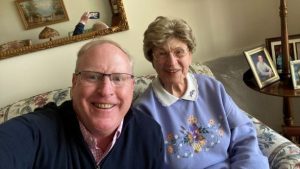Hair Care Tips for Seniors
While we often think of self-care from the perspective of health and physical wellness, a major part of self-care involves taking steps to look and feel your best, whether through your clothes, skincare, makeup or hair care. Here, the caregivers at Avila Home Care discuss hair care tips that every senior should know to keep their locks looking great.
Choose a Shampoo That Meets Your Needs
As we age, the natural color of our hair can fade and develop a more gray or yellow hue. For yellowing hair, choose a shampoo with a blue or violet tint. Hair that has gone gray is more coarse and dry than our naturally colored hair, which means it requires more moisture. Choose a shampoo that is free of sulfates, which are harsh and can strip hair of its natural oils. Shampoos made with humectant ingredients, such as glycerin, sodium PCA or sodium lactate, will help to bind moisture to your strands and prevent dryness.
Consider Hair Loss Treatments
There are a variety of reasons individuals experience hair loss, but hair loss is also a natural part of the aging process. If you are uncomfortable with the amount of hair loss you are experiencing, you may consider products such as Rogaine or Theroxidil, which are the only over-the-counter hair loss treatments approved by the FDA for use on men and women. While these products will not correct a receding hairline, they will help to stimulate overall hair growth. Be sure to speak to your doctor before beginning a hair loss treatment regimen.
Use the Right Products
Because of the way our hair changes as we age, many seniors may struggle with limp, dull or dry hair. Limp hair requires products that boost volume, such as mousse, thickening shampoo, texturizing sprays or hairspray. Dull and dry hair requires moisture that will not weigh hair down—consider a lightweight leave-in conditioner, shine spray or water-based cream product. If using hair oil, remember that a few drops is all you need to add some much-needed shine and softness.
Try Heatless Styling Options
Excessive heat styling can do major damage to anyone’s hair, but it can be particularly damaging for seniors due to the nature of aging hair. Avoid blow dryers, straightening irons, curling wands and other heat styling tools whenever possible. If you must use heat styling tools, use tools that allow you to adjust the temperature, and coat your hair with a heat protectant product before applying heat. Separate strands into one-inch sections and do not reapply heat to styled sections. If possible, try not to use heat styling tools several days in a row.
Maintain a Hair-Healthy Diet
Finally, it is important to remember that the foods and supplements we consume have a major impact on the health of our hair, not just the products we apply to it. Foods containing healthy fats, such as fatty fish, nuts and olive oil, help to keep hair hydrated from the inside. Foods such as eggs and berries contain nutrients that promote hair growth and strength. Supplements such as biotin or other B-vitamins can also help promote healthy hair. Be sure to always consult your doctor before taking supplements or vitamins.
Your Avila Home Care Provider is Here to Help You Look and Feel Great
At Avila Home Care, we believe that the little things matter just as much as the major aspects of home care. Whether it is helping a senior style their hair or assisting them to choose the perfect outfit for a social gathering, we believe that looking and feeling your best helps your golden years to be all the sweeter. To learn more about the services provided by our dedicated home care professionals, contact Avila Home Care today!
Home Tips to Prepare for Winter Weather
Fall is here, and that means winter is just around the corner, with cold temperatures, icy walkways and gloomy skies. Here, the homecare specialists at Avila Home Care detail ways to help prepare you or your elderly loved one for impending winter weather. Check Outdoor Areas Fall is the perfect time to have a routine outdoor inspection…
Read More...Avila Home Care Receives 2020 Best of Home Care® – Provider of Choice Award
Baltimore – Avila Home Care announced today that it has received the 2020 Best of Home Care – Provider of Choice Award from Home Care Pulse. The Provider of Choice Award is granted only to the top-ranking home care providers, based on client satisfaction scores gathered by Home Care Pulse, an independent satisfaction research firm…
Read More...

